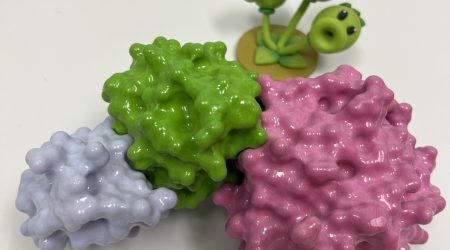The history and achievements of a collaborative technical community across research institutes

We catch up with Dr Clare Stevenson to learn more about the formation and growth of the Research Institute Technician Group (RITG), which supports and champions technicians across research institutes.
“I’m passionate about raising the visibility of technical staff at the John Innes Centre, which includes all staff who work to support our science outside of Group Leader, Postdoctoral Researcher or student roles.
When the Technician Commitment was established in 2007, I was delighted to sign up the John Innes Centre as a founding signatory.
The Commitment aims to ensure visibility, recognition, career development and future sustainability of technical skills for technicians working in higher education and research, across all disciplines.
The Technician Commitment hold signatory meetings twice per year and these are amazing events with a fantastic buzz about them.
In those early days I often found myself the only institute voice at a table with University leads and it was eye opening hearing about the issues faced by technicians in Higher Education (HE). Universities have separate job families for academic and technical roles whereas at John Innes Centre and other Research Institutes we do not make this distinction, although we do share many of the same issues around recognition, visibility and career development.
It was at this first event that we decided that Research Institutes should get together and form a group that reflects their identity and the Research Institute Technician Group (RITG) was conceived.
We kept in touch and developed the idea and in December 2018 we had our first meeting. This started small and was organised by Jeroen Stam (then at MRC and now at NBI), Tertius Hough (MRC Harwell), David Hudson (Francis Crick), Dawn Percival (Wellcome Sanger Institute) and myself (JIC).
The first meeting was a huge success and we decided that as a group we could collaborate on our initiatives and share good practices, raise the awareness of research institute technical staff, provide support for each other and look into cross institute mentoring as well as hosting a conference.
After the meeting, the Babraham institute and the Institute of Cancer Research came on board and a survey of technical staff from six institutes was carried out. One of the outcomes was an interest in an inter-institute conference focussed on technical careers and the group responded to this by hosting the first Research Institute Technician Symposium (RITS).
RITS 2019 was held at The Francis Crick Institute in London as it coincided with the a public exhibition celebrating the work of technicians.
Ed Cannon from Sanger really took a lead in the organisation which we were hugely grateful for, but we all pulled together as a team. It was a huge learning curve.
The event organising involved logistics, printing the programmes, obtaining sponsorship and the pre- and post-surveys
111 technicians attended on the day and I think everyone that attended the event really enjoyed it. Hopefully they went back to their institutes with enthusiasm for technical roles, new connections and an awareness of the other institutes. In the conference feedback survey one suggestion was to set up a LinkedIn group, which is now established and has 129 members.
Part of the ethos of RITG is to come together and share good practice. From the collaborative group, we have taken ideas back to the John Innes Centre.
For example at the John Innes Centre we started an electronic suggestion box and the recognition cards initiative (implemented by Carole Thomas) which came out of discussions with the Wellcome Sanger institute.
In June 2019 I was invited to share the JIC Technician Commitment experience at the Sanger Institute Technician Commitment launch event and this led to Burcu Bronner Anar (then a Technician Rep and now full time Technician Commitment Sanger lead) and I giving a joint talk at the S-Lab conference in September 2019 about technical roles at research institutes.
We have gone on to give a range of collaborative talks at Technician Commitment signatory events.
In October 2021 Danielle Hoyle from Babraham and I gave a presentation about RITG at the National Technician Development Centre (NTDC) virtual event. It was great to recognise and celebrate what we have achieved in the 3 years since the RITG began.
When the pandemic started in 2020 the RITG continued hosting a range of events virtually. The events were hosted by different institutions and advertised on twitter which opened the virtual events to a wider audience at Universities and all Research Institutes.
At this time Sarah Tolland joined the organisation team to provide fantastic administration skills for which I am truly grateful. Throughout 2020 to 2021 we held a variety of events, including networking sessions, promoting professional registration and involvement in outreach and communication along with events discussing the wider role of technicians in research culture.
In addition to our virtual seminars there was lots of engagement and involvement at the regular monthly committee meetings.
We started our first newsletter in October 2020 and continue to share news and opportunities across research institutes quarterly.
Our Technician Group twitter started in July 2020 to share what we are doing outside the group, using it as a forum to recognise and increase visibility of the technicians at our institutes and share information about initiatives such as awards schemes and training opportunities .
Virtual events are great as they allow a wider chance of participation, but for me nothing beats having an event in-person.
RITS2021 took place in November 2021 as an in-person event held at MRC Harwell near Oxford. It was fantastic that 60 technicians attended our event ‘owning your technical career’.
RITS2021 was the first time many of the committee had met in person and it was a great experience. During the pandemic we had three new Institutes join (MRC-LMB, MRC-LMS and STFC) and new leads bringing our membership to nine research institutes.
As a group one of our aims was to have a research institute award scheme. The Research Institute Technician Awards (RITAs) were launched in 2021 with five categories celebrating, recognising and increasing visibility of technical staff achievements.
The awards were presented at the conclusion of RITS2021 and all 63 technical staff nominated received a copy of their nomination and a certificate.
Each Institute celebrated their nominated staff and winners. Here at the John Innes Centre Research Assistant Lesley Mitchenhall received a Lifetime Achievement award in recognition of her work in co-authoring high-profile several papers and training others . The awards will return in 2023 alongside RITS2023.
As we look to the future I ask myself “What is next for the Research Institute Technician Group?”
We’ve achieved a lot. Most committee members do their Technician Commitment roles on top of their normal roles. There will be some changes in the committee and I want to thank Danielle Hoyle from Babraham who will be passing on her role and Rajvee Shah Punatar who was interim lead for the Crick and will be going back to her technical role.
I too will be stepping down from RITG as I am moving from a technical role to a management position as Head of the Directorate at the John Innes Centre.
There will be a new Technician Commitment lead at the John Innes Centre and in my new role I plan to provide support for all roles at the institute.
It is the people that make a difference and I have been very lucky to work with so many enthusiastic, passionate and hard-working people over the years in RITG and I hope we stay in touch.



